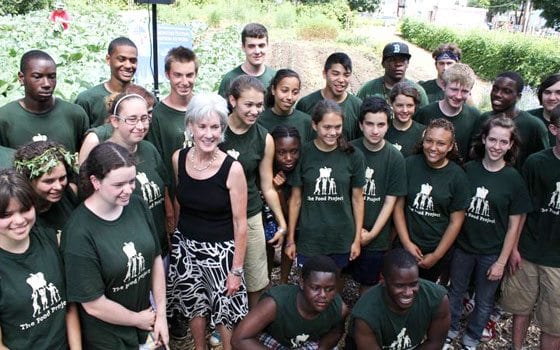
U.S. Health and Human Services Secretary Kathleen Sebelius toured The Food Project’s urban farm in Roxbury last Friday and liked what she saw, calling it a national model in the fight against obesity.
With Mayor Thomas M. Menino in tow, Sebelius, visited the West Cottage Street farm to witness first hand how federal stimulus funds are being used here in Boston to foster healthier lifestyles.
Four months ago, Sebelius announced that the city of Boston would receive a $12.5 million, two-year stimulus grant for “Communities Putting Prevention to Work,” a nationwide initiative to curb obesity and tobacco use.
According to the Journal of the American Medical Association, tobacco use, poor diet and lack of exercise are the leading causes of preventable deaths in the United States.
To address those problems, President Barack Obama’s 2009 stimulus package included $650 million for evidence-based, clinical and community-based prevention strategies to address chronic disease. “Communities Putting Prevention to Work,” an initiative of the Department of Health and Human Services, was subsequently developed to reduce risk factors for chronic disease and to promote wellness in adults and children. This initiative awarded $372 million to 44 communities — including Boston — across the U.S.
“We’re looking to create the healthy community environments that will help prevent heart attacks, strokes, cancer, diabetes and other serious health problems on a broad scale,” said Sebelius when she made the announcements last March. “And, by preventing and controlling chronic disease, we can start to turn around rising health care costs as well.”
Boston received $6.4 million for obesity prevention and $6.1 million to reduce tobacco use, and is the only city in Massachusetts to receive these funds.
Approximately $1 million of the $6.4 million designated for obesity prevention will be used to increase access to healthy and affordable produce in Roxbury, Mattapan and Dorchester. In these neighborhoods, obesity rates stand far above state levels — 40 percent, 33 percent and 31 percent, respectively, compared to the 20.9 statewide average.
This money will be used to hire and train up to 250 youths to work with The Food Project to build 400 backyard gardens in three neighborhoods, to create a community growing and education center in Roxbury, to double the number of community gardening plots in Dorchester and expand the size of existing ones, among other activities.
Started in 1991, The Food Project brings urban and suburban youth together for local farming and gardening programs. These programs address the problem of urban food access by supplying healthy and affordable produce to low-income neighborhoods.
“These innovative projects not only create healthy, fresh, and affordable food choices right here in your own backyard, it also gives young people a hands-on opportunity to develop healthy living habits that can benefit them for the rest of their lives,” Sebelius said after she toured the urban farm. “Urban farms like this one that are putting prevention to work are really models for the rest of the country. The young people who work here are not just building a healthier Boston, but a healthier America, too.”
In addition to these gardening initiatives, the money will also be used for counter-advertising and policy change to decrease the consumption of sugar-sweetened beverages, enhancing physical education and activity in schools, and increasing active transit throughout the city.
“The next two years will be an exciting time for Boston, as we join forces with our community partners to make real change happen in our city, both on reducing exposure to tobacco and fighting obesity,” said Dr. Barbara Ferrer, executive director of the Boston Public Health Commission, the local agency that received the federal funding.
Funds for tobacco reduction will be used for implementing regulations and policy changes to limit tobacco access, influence price, and increase the number of smoke-friendly environments, and for connecting Boston residents to tobacco-cessation services.
Since President Obama signed the $787 billion economic stimulus bill last year, $200 billion has been awarded in contracts, grants and loans nationwide. Massachusetts has received more than $5 billion.


![Banner [Virtual] Art Gallery](https://baystatebanner.com/wp-content/uploads/2024/04/Cagen-Luse_Men-at-store-e1713991226112-150x150.jpg)



